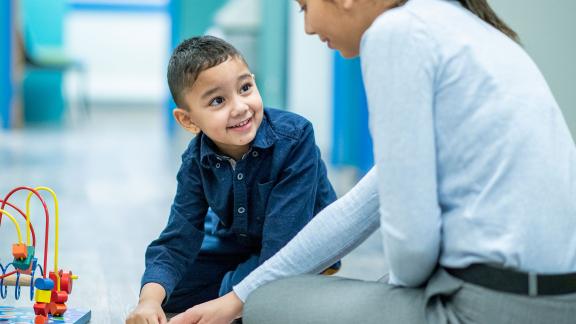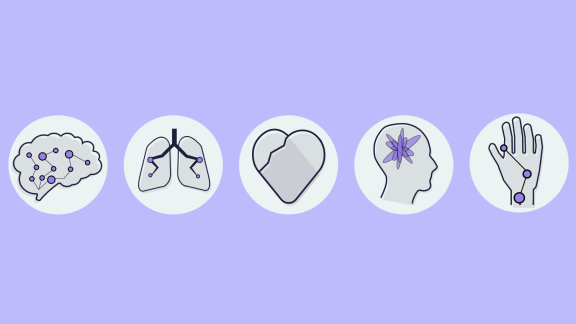Building Bridges: Integrating health and care in St Helens

Overview
Change Grow Live (CGL) in collaboration with health and care organisations in St Helens, created the Building Bridges programme aimed at supporting families impacted by alcohol and drug misuse.
The programme funded by national funding, focuses on early intervention for families affected by parental alcohol dependency, providing screenings for alcohol-related health conditions and upskilling the workforce.
Despite facing challenges due to the area's deprivation and high rates of alcohol-related issues, the programme achieved positive outcomes, including increased engagement in alcohol recovery treatment and enhanced collaboration among health and social care providers.
The programme highlights the importance of integrated working, early intervention and a person-centred approach in addressing complex health and social issues within communities.
Key benefits and outcomes
The Building Bridges programme in St Helens, in collaboration with CGL brought several benefits for the systems workforce, which include:
- Between 2018 and 2021, the programme trained and upskilled over 1200 staff members. This training helped increase their awareness of parental alcohol dependency and its impact on children, resulting in a more knowledgeable and capable workforce.
- As a result of the training, professionals are now better equipped to identify early signs of alcohol dependency, leading to an increase in professionals identifying alcohol-related issues during child needs assessments.
- The programme also facilitated a positive culture for integrated working within the St Helens health and social care workforce. By collaborating with statutory and voluntary children’s services, police, schools, housing and domestic abuse services, the workforce has worked more effectively with external partners, fostering a collaborative approach to addressing complex needs.
- Professionals trained by CGL adopt a person and family-centred approach to addressing parental alcohol dependency, which emphasises understanding the holistic needs of individuals and families. This approach aligns with the principles of patient-centred care.
- The programme has been successful in engaging individuals with alcohol dependency issues and facilitating their access to appropriate care and support services. It led to an increase in parents disclosing substance misuse and receiving alcohol recovery treatment.
Overall, the Building Bridges programme has had a positive impact on the workforce in St Helens by providing training and support to address parental alcohol dependency, fostering integration and collaboration with partners and promoting a person and family-centred approach to care delivery.
What St Helens faced
In St Helens, nearly a quarter of residents reside in neighbourhoods classified among the ten per cent most deprived in England. The local authority of St Helens ranked eighth in the UK for relative health deprivation according to the Multiple Deprivation Index of 2019.
The population of St Helens faces significant challenges, with a considerable number of individuals either directly affected by alcohol-related issues or living with someone who is.
Statistics from two of the St Helens Council State of the Borough reports showed that in 2017/18 St Helens had:
- the thirteenth highest hospital admissions due to alcohol use out of 152 authorities in England (St Helens 2018 Lifestyles report).
- the second highest rate in England for alcohol-specific hospital admissions for young people under 18 (St Helens Joint Strategic Needs Assessment, 2019).
What CGL did
Created a culture for integrated working
CGL developed the Building Bridges programme underpinned by a holistic, person-centred and family-led approach, recognising the importance of addressing individuals' needs in their entirety. Through collaboration with St Helen's children's services, a concerted effort was made to align efforts towards a common objective, fostering a culture of working as one rather than operating as separate partner agencies.
This collaborative approach allowed CGL to establish a foundation for integrated working, and help decision making at a community level.
Established an early intervention and family specialist workforce
CGL created three new roles, the early intervention coordinator, a family recovery champion and a complex case social worker. These roles expanded CGL's expertise to provide early intervention to families and create employment opportunities for St Helen's workforce.
The Building Bridges programme introduced three intervention programmes to address the impact of alcohol dependency and behaviours that affect the entire family. The three intervention programmes are:
- A brief intervention of six sessions that aims to reduce the impact of alcohol use on families.
- The Moving Parents and Children Together (M-PACT), is a twelve week whole family programme working with children and families with complex needs affected by substance use.
- Confident parenting, a twelve week parenting programme for parents with alcohol-related issues.
The Building Bridges team attends Multi-Agency Safeguarding Hub (MASH) meetings to encourage integration and work with partner services for shared learning. CGL became a valued member of St Helen's safeguarding partnership through collaborative working and shared values.
Built strong relationships with partners
CGL successfully integrated its services by incorporating the Building Bridges programme at every level. This inclusive approach fostered a collaborative atmosphere, facilitated by the placement of Building Bridges staff within community organisations and institutions.
Through tailored training initiatives, CGL upskilled and empowered over 1,200 professionals across the St Helens borough, fostering a culture of integrated working. By actively engaging with strategic steering groups, CGL is forging positive relationships with leaders and exerting influence on decision-making at a community level.
Results and benefits
The benefits of the CGL and Building Bridges programme, as shown in the 2023 Department of Health and Social Care report, revealed that in St Helens:
- Health and care staff identifying alcohol related issues in child needs assessments increased from 293 (2018) to 433 (2020).
- There was a 40 per cent increase in parents receiving alcohol recovery treatment at CGL, leading to 2000 screenings for alcohol related long-term conditions.
- The Building Bridges programme helped 217 children in St Helen’s who live with a parent accessing treatment.
Other results include:
- The change towards emphasising a child-focused vision of safeguarding by collaborating with both statutory and voluntary children’s services, the police, schools, housing and domestic abuse services.
- Introducing specialised roles that provide enhanced recruitment and progression opportunities for both CGL staff and the St Helens community.
- The implementation of a recovery champion role has integrated individuals with lived experience of parental alcohol dependency into the workforce.
- Through training, 1200 professionals are now equipped to confidently identify early signs of alcohol dependency and offer timely interventions, resulting in an increase in residents receiving appropriate care for their alcohol dependency
“We relate very closely with CGL St Helens, we have a close relationship with them and the workers there. Whatever we need from them, they're always willing to provide it. Often, they will refer clients over to us and vice versa.” - MASH safeguarding partner.
Overcoming obstacles
The success of the Building Bridges programme led CGL to face a significant demand for treatment and an increase in the complexity of client cases. This challenge became exacerbated by the national increase in alcohol related issues during the COVID-19 pandemic.
However, the COVID-19 pandemic highlighted the benefits of integrated working. CGL collaborated with community voluntary services to address the needs of residents. For example, volunteers delivered medication to CGL clients who needed to self-isolate, helping residents maintain recovery treatment. The pandemic developed St Helen’s workforce's ability to work cohesively as a team, further strengthening the place’s integrated working.
Next steps
CGL St Helens have been awarded further funding to expand their family services. They plan to use this funding to provide focused support for young people and children affected by parental alcohol dependency. The funding will enable them to meet the increased demands for their services and provide direct interventions through family referrals, including psychotherapy and counselling services. The funding will also generate employment opportunities and increase retention by upskilling more of St Helens workforce.
Contact
For more information please contact:
- James Mawhinney James.Mawhinney@cgl.org.uk
- Andy Martin Andrew.Martin@cgl.org.uk
- Rachel Fance Rachel.Fance@cgl.org.uk



